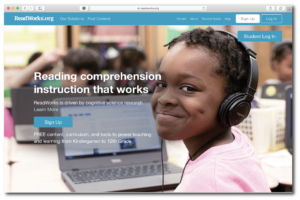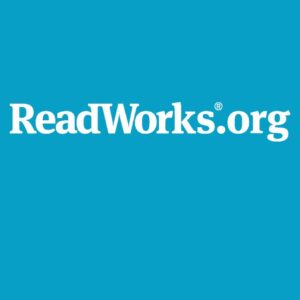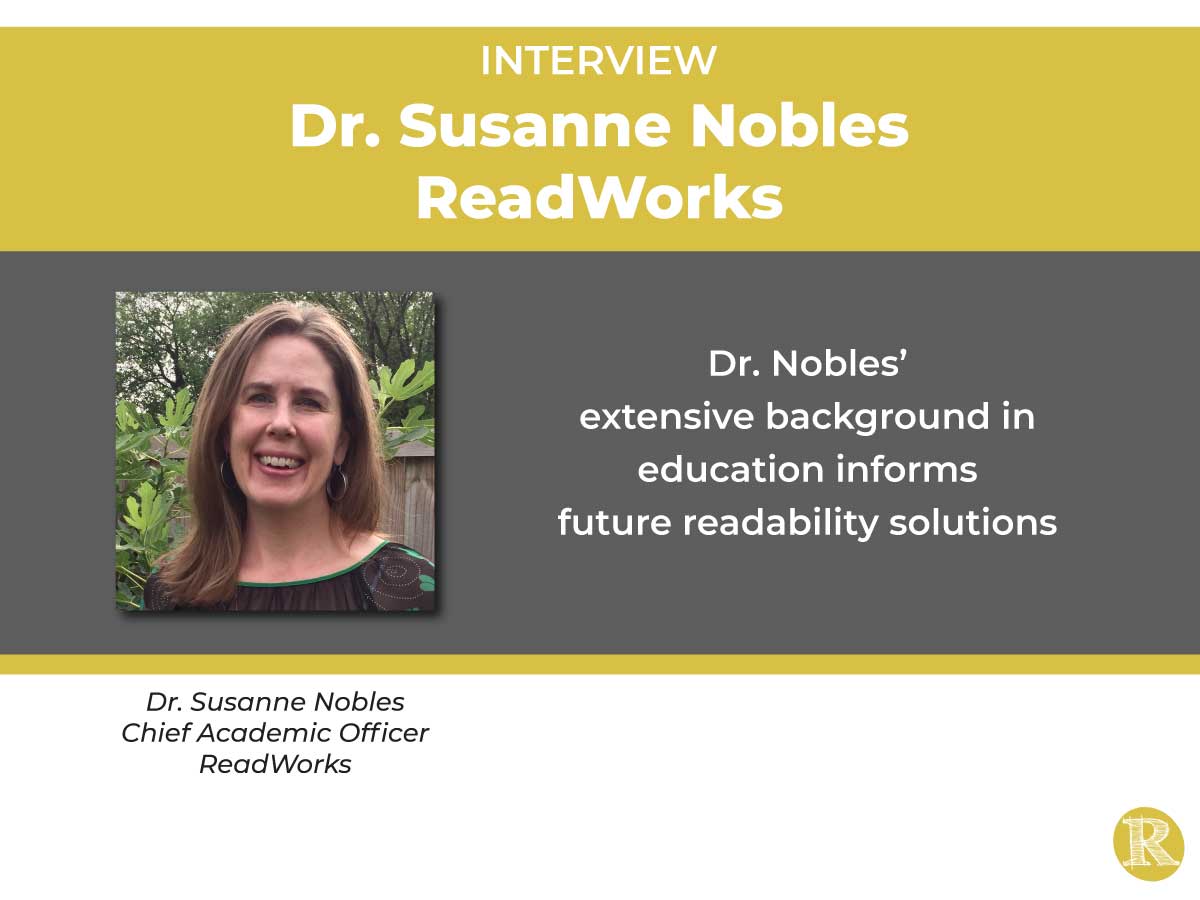A Discussion on Reading, Resources for Educators and Readability Research
Readability Matters got the chance to sit down with Dr. Susanne Nobles, the Chief Academic Officer of the education-focused nonprofit, ReadWorks. We learned more about ReadWorks and the work Dr. Nobles does to advance research-informed readability solutions.
Thank you so much, Susanne, for sitting down with us. We have enjoyed our collaboration with you and your ReadWorks colleagues. Can you tell the audience about ReadWorks – what is the problem you all solve?
 Our mission at Readworks is to help all students become successful, joyful readers. Reading is a gateway to learning and success in life. Yet, NAEP scores show that 65% of all 4th graders in the U.S. cannot read and comprehend at grade level. As a nonprofit, we provide K-12 teachers resources for teaching reading comprehension— online, for free (always!), and to be shared broadly. Over one million teachers annually integrate our content, curricular supports, and digital features with their core curricula to improve how reading is taught to and learned by 17 million students.
Our mission at Readworks is to help all students become successful, joyful readers. Reading is a gateway to learning and success in life. Yet, NAEP scores show that 65% of all 4th graders in the U.S. cannot read and comprehend at grade level. As a nonprofit, we provide K-12 teachers resources for teaching reading comprehension— online, for free (always!), and to be shared broadly. Over one million teachers annually integrate our content, curricular supports, and digital features with their core curricula to improve how reading is taught to and learned by 17 million students.
Tell us about your background and what attracted you to ReadWorks. What does it mean to be the Chief Academic Officer?
I have been in education for my whole career. I taught English and was an administrator for 22 years before a family move took me out of my current school and to a new city. I took this opportunity to complete my PhD and begin working in the education nonprofit space, specifically focusing on research-based best practices for edtech. I came to ReadWorks because of the rare opportunity it offered me to have both a very broad impact across many, many classrooms and a very deep impact working with ReadWorks educators to study and improve our offerings. Being Chief Academic Officer means I work with an amazing team focused on all things teaching, learning, and content! I work to ensure that all that ReadWorks offers, from our teaching tools to our content, is based in the science of reading and research-based best practices. I then oversee our internal and external (with partners like you all!) research projects — all done with the goal of continually improving our offerings and helping advance the field in our understanding of how to best support reading comprehension.
We are all members of an interdisciplinary Readability Research Community. The goal is to learn more about personalized reading and what works well for individuals. Can you explain your role in the community?
In my role in this diverse and exciting community, I work to represent educators — their perspectives and their use cases for this kind of research. I also think about how education theory intersects with the broader readability research being done by this community, specifically towards the very exciting goal of understanding how readability and reading comprehension intersect.
We are working together with Dr. Shannon Sheppard (a cognitive neuroscientist at Chapman University) and Dr. Sofie Beier (a typography expert at the School of Design at the Royal Danish Academy) on a study of 450 6 to 14-year-old students… We already know that Readability changes can impact reading speed and accuracy. Can you explain the importance of looking specifically at changes in comprehension?
Yes, happy to talk more about this! Your early readability research has shown strong fluency gains in young readers, which is very exciting. The next critical step is understanding if and how these fluency gains impact comprehension, the ultimate goal of reading. Fluency plays a major role in comprehension, as fluent readers are able to put more cognitive energy into understanding the author’s meaning across sentences, paragraphs, and whole texts when they do not have to work to decipher individual words. Yet, we cannot assume increases in fluency also mean better comprehension. Developing studies that can determine if and how a reader’s comprehension also improves with personalized readability formats is a critical next step. Imagine a world where we understand how readability formats can support readers’ comprehension, where teachers have a tool to determine each student’s best readability format, and where students have the ability to adjust what they are reading to this format in support of their comprehension — THAT is tech for good.
 About Dr. Susanne Nobles: Susanne has spent her career working to empower educators and students with research, structures, and tools for meaningful and effective learning. She led Digital Promise’s collaborative work with developers, researchers, and educators for the Learner Variability Project (LVP). Susanne has also been an adjunct instructor with Relay Graduate School of Education and a high school teacher and administrator. Her Ph.D. research focused on creating effective digital communities of practice.
About Dr. Susanne Nobles: Susanne has spent her career working to empower educators and students with research, structures, and tools for meaningful and effective learning. She led Digital Promise’s collaborative work with developers, researchers, and educators for the Learner Variability Project (LVP). Susanne has also been an adjunct instructor with Relay Graduate School of Education and a high school teacher and administrator. Her Ph.D. research focused on creating effective digital communities of practice.




